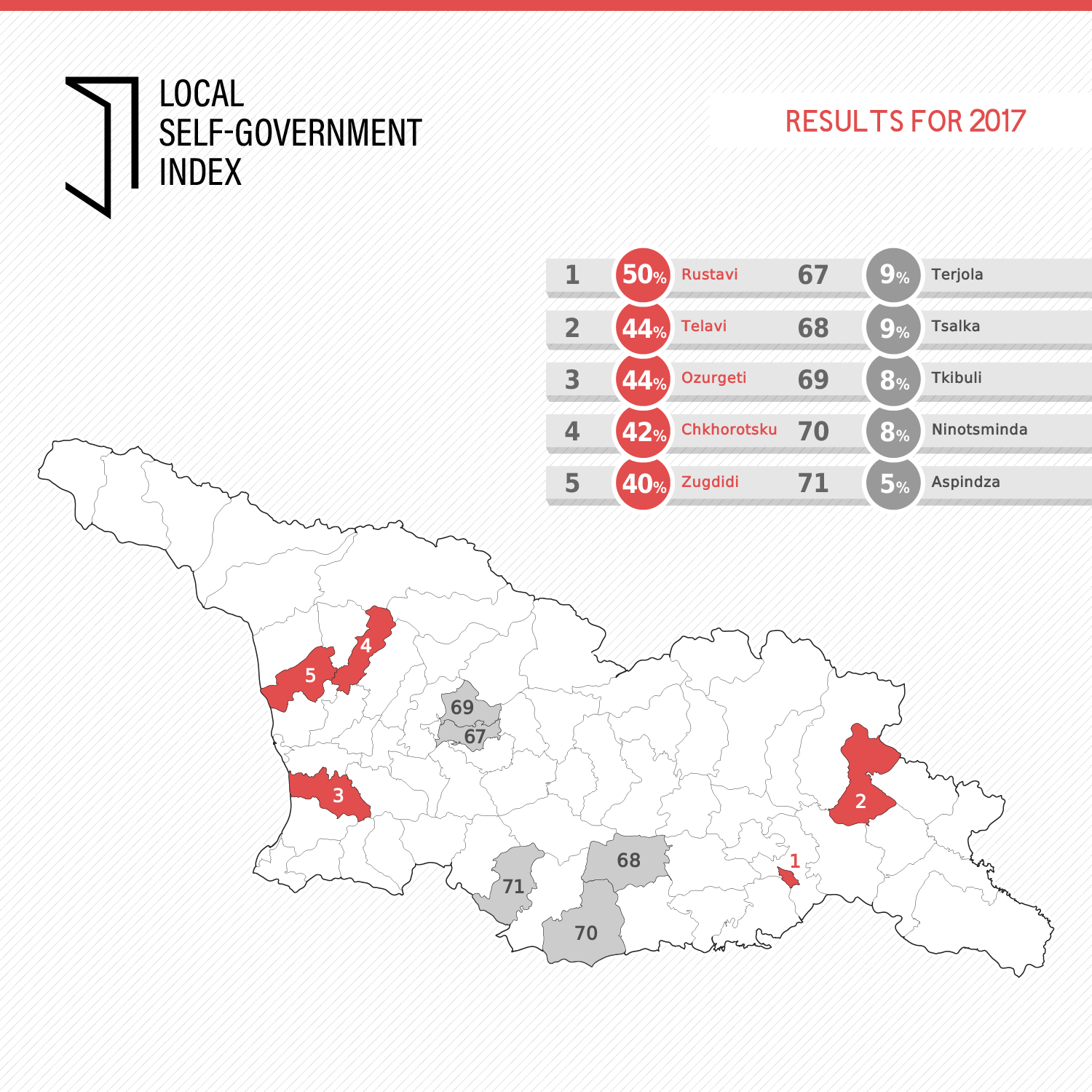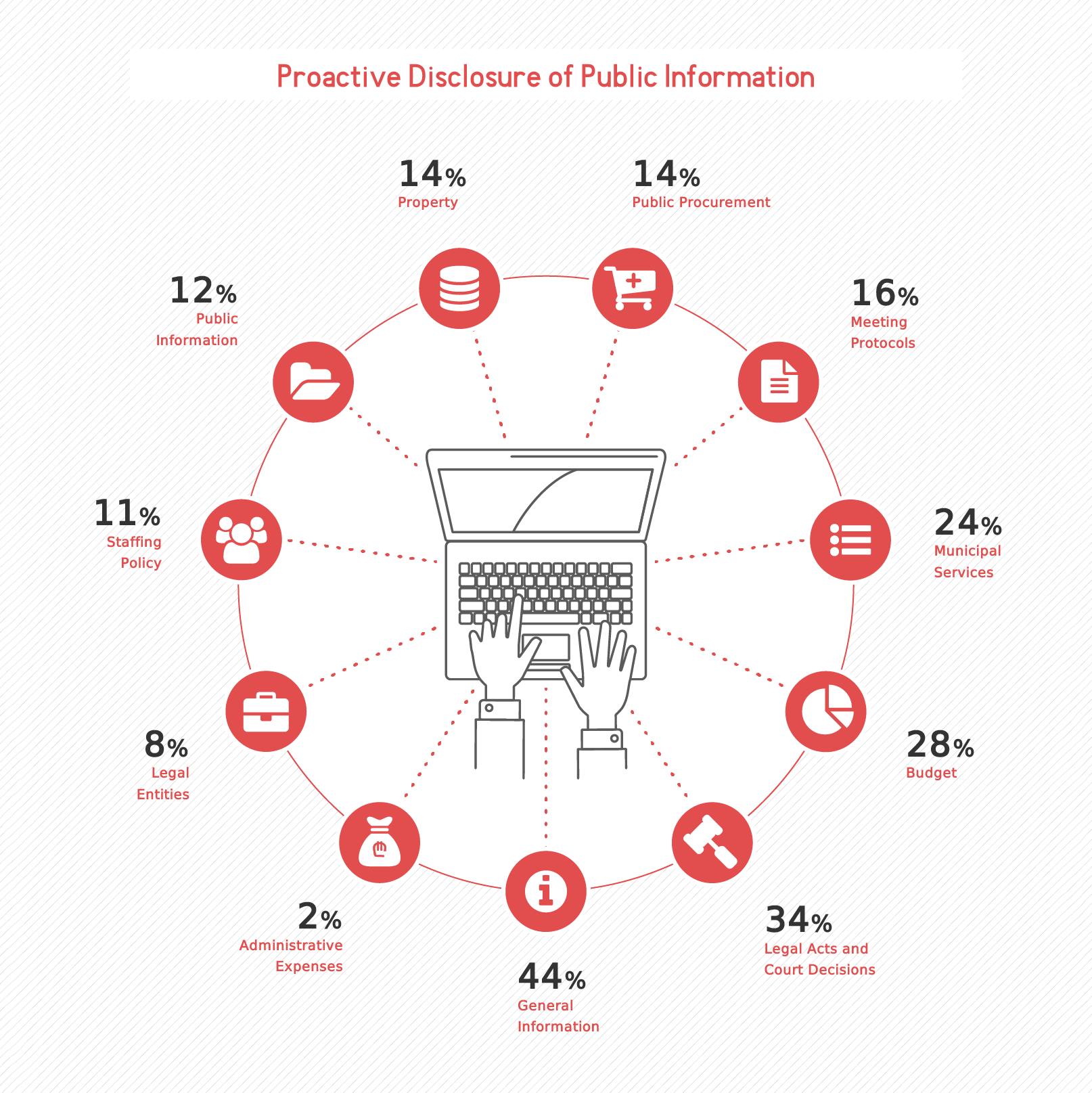


 On December 5, 2017, at the Hotel Holiday Inn, a presentation was held of the Local Self-Government Index and the first report of the national evaluation of the transparency and accountability of municipalities in Georgia. The event was opened by the Executive Director of Open Society Georgia Foundation Keti Khutsishvili, Chairman of the Parliament of Georgia Irakli Kobakhidze and Tbilisi Mayor Kakha Kaladze.
On December 5, 2017, at the Hotel Holiday Inn, a presentation was held of the Local Self-Government Index and the first report of the national evaluation of the transparency and accountability of municipalities in Georgia. The event was opened by the Executive Director of Open Society Georgia Foundation Keti Khutsishvili, Chairman of the Parliament of Georgia Irakli Kobakhidze and Tbilisi Mayor Kakha Kaladze.
The Local Self-Government Index assesses the transparency and accountability of Georgian municipalities. It is aimed at establishing transparent and accountable local governance in the country, increasing citizen participation, reducing corruption risks and sharing of experience between municipalities.
The Index was created by the Centre for Training and Consultancy (CTC), Institute for Development of Freedom of Information (IDFI) and Management Systems Development Center (MSDC). The project was funded by Open Society Georgia Foundation.
The Local Self-Government Index consists of 3 thematic blocks: proactive disclosure of public information, electronic governance, and citizen participation and accountability, which combine 100 evaluation criteria.
The evaluation of the transparency and accountability of municipal bodies in Georgia was carried out from May 15 to July 15, 2017. All Georgian municipalities, except for Azhara, Akhalgori, Eredvi, Tighvi and Kurta, were evaluated. The evaluation was carried out with the involvement of 21 representatives of 10 regional civil society organizations. The evaluation was made using the online platform - WWW.LSGINDEX.ORG.
Key Findings:
● On the scale of 0 to 100%, the average result of all municipalities was only 21%
● The majority of municipalities fail to reach even 20% in proactive disclosure
● Only 10-12% of municipalities publish (incomplete) information about their administrative expenses
● More than 40% of executive bodies do not publish any information on ongoing tenders on their website
● More than 50% of executive bodies do not publish annual reports
● Use of new technologies in the field of citizen services is rare (online permits, SMS alerts, online surveys)
● The quality of technical characteristics of municipal websites is below average (34%)
● In the last year, more than 85% of municipalities have not held a single general assembly of a settlement
● More than 60% of municipalities have not held a session or public meeting of the council of civil advisors
● Only two municipalities had included citizen participation programs in their budget
● More than 70% of municipal councils do not inform citizens about their scheduled sessions in advance and do not publish session protocols
● More than 60% of municipalities do not practice the hearing of performance reports of municipal council members
● Almost no information is being published about municipal legal entities
The following municipalities were awarded certificates for receiving the highest scores in the 2017 National Evaluation of Transparency and Accountability of Georgian Municipalities:
- Rustavi City Municipality
- Telavi Municipality
- Ozurgeti Municipality
- Chkhorotsku Municipality
- Zugdidi Municipality
In addition, the participatory budgeting project titled Civil Budget run by Marneuli Municipality was named as the best citizen participation initiative.
Municipalities with the Highest and the Lowest Results

Results for 2017: Proactive Disclosure of Public Information

The project team also elaborated the following recommendations to help overcome the challenges that were identified as a result of the evaluation:
● Municipalities must update their list of information to be disclosed proactively and create a public information section on their websites, where thematic public information will be posted. They must also introduce quick and efficient procedures for issuing public information
● Municipalities must introduce online services
● Municipalities must develop budgetary programs that support citizen participation.
● Municipalities must take greater effort to strengthen the practice of using general assemblies of a settlement and civil advisor councils as legal mechanisms of citizen participation
● The degree of accountability of elected mayors and municipal council members to voters must be increased.